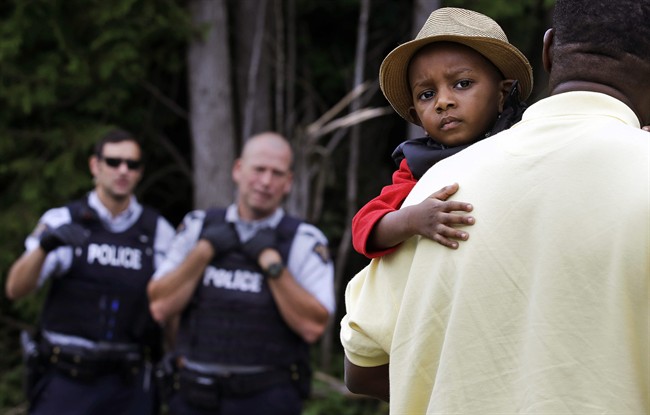They may come in waves, all at once, or not at all.

But government officials in Canada say that regardless of how Haitians living in the United States under temporary protection status (TPS) react to losing that status, they’ll be ready.
The American government confirmed on Monday that as of July 2019, it will end TPS for around 60,000 Haitians who took up residence in the U.S. after a deadly earthquake rocked their island home in 2010.
READ MORE: How the feds plan to house asylum seekers entering Canada as winter approaches

That gives those people just over 19 months to get their affairs in order and leave, and it’s possible that some will head north seeking asylum in Canada.
“That’s an unpredictable number at this moment,” acknowledged Public Safety Minister Ralph Goodale on Tuesday morning on his way into a cabinet meeting.
“Through the course of this year the numbers, as you know, have fluctuated dramatically, at some times being very low, sometimes being very high. We’ve tried to take all of the contingencies into account.”
READ MORE: U.S. ending temporary permits for nearly 60,000 Haitians, putting Canada on alert
Liberal MP Emmanuel Dubourg, who is himself Haitian, was in New York City on Tuesday to meet with various members of the diaspora community. The trip is part of a recent push by the government to counter the spread of misinformation on social media about the ease of coming to Canada.
MPs have been dispatched to several U.S. states in recent weeks as the Americans continue to review temporary protection status for a number of countries. More trips are being planned to Texas, New York and California.
One of the people Dubourg met with on his most recent trip was Brooklyn-based immigration lawyer Emmanuel Depas. On Tuesday, Depas told Global News that he doesn’t expect a big wave of arrivals until 2019, a few months before the status is formally lifted and Haitians are subject to deportation.
WATCH: Man seeking refugee status in Canada can’t convince immigration officials that he’s gay

Depas said his advice to people under TPS who are thinking of heading north is to call an immigration lawyer in Canada first. The purpose of his meeting with Dubourg was to work out a strategy to avoid another big flood of Haitian arrivals, he added.
“Asylum is very complicated, especially when you’re coming from a safe country such as the United States,” Depas said from his office in Brooklyn.
“A lot of these people, unfortunately, are ineligible for asylum … most likely those claims will fail, so it’s likely that those people will be deported back to Haiti.”
According to Depas, Dubourg seemed “very concerned” about the possible influx. The men are hoping to organize seminars with other lawyers and stakeholders who can then help educate Haitians about their options.
Depas also said he’s also hoping that the U.S. Congress will pass legislation that will allow TPS-holders to pursue legal citizenship in the U.S.
But Marjorie Villefranche, director general of Montreal’s Maison d’Haiti, said she’s not so sure there will be another wave at all. Haitians who decided they were going to come to Canada have already made that trip, she said Tuesday, crossing the border at Lacolle, Que., over the summer.
READ MORE: Canada readies for potential refugee influx as U.S. ends protection status for Nicaragua
But the backlog in Canada’s immigration system is already bad, Villefranche noted. While work permits have been issued, thousands of people who crossed over the summer are still waiting to hear if they can formally apply for asylum.
Quebec’s immigration minister, David Huertel, said Tuesday that his province isn’t worried about another big wave — at least not right away. Quebec has seen far more irregular border crossings this year than any other jurisdiction.
“We’re doing everything to limit the surprise as much as possible,” he told reporters from Radio-Canada and La Presse.
Huertel is expected in Ottawa later this week for a federal-provincial meeting on the matter. He met with the U.S. consul general in Montreal on Tuesday.
https://twitter.com/Heurtel/status/933061090392662018
— With files from Mike Armstrong and Mike Le Couteur
- Freeland set to table 2024 federal budget in the House of Commons
- All a-boot tradition: A look at finance ministers’ budget shoes through the years
- Inflation ticked higher in March. Are Bank of Canada rate cuts still in the cards?
- Food service strike: Air Canada, WestJet refine menus at Toronto Pearson




Comments